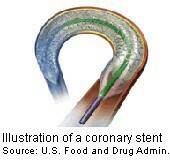Study Finds Both Coated Stents Perform the Same
Incidence of major adverse events was also lower than researchers anticipated.
By Ed Edelson
HealthDay Reporter
|
E-mail this article
Subscribe to news
Printer friendly version
|

(SOURCES: Kirk Garratt, M.D., clinical director, interventional cardiovascular research, Lenox Hill Hospital, New York City; Debabrata Mukherjee, M.D., professor, interventional cardiology, University of Kentucky, Lexington; Jan. 30, 2008, Journal of the American Medical Association)
TUESDAY, Jan. 29 (HealthDay News) -- In a large study comparing the real-life effectiveness of two different drug-coated stents, Danish researchers found no overall difference between the two stents and a lower rate of problems than had been anticipated.
The scientists looked at more than 2,000 people who had these flexible tubes implanted to help keep arteries open, and the rate of major adverse events such as death, heart attack or blockage of the treated artery was about the same for stents coated with the drug paclitaxel, marketed by Boston Scientific, and those coated with sirolimus, marketed by Cordis. The report, funded by both stent makers, is published in the Jan. 30 issue of the Journal of the American Medical Association.
The study included people who underwent the artery-opening procedure called angioplasty, followed by stent implants, for a variety of conditions. It mostly involved patients who had had heart attacks, but it included some who had the disabling heart pain called angina. Previous, smaller studies have included a much narrower patient base.
"This is the first large-scale study to address the problem this way," said Dr. Kirk Garratt, clinical director of interventional cardiovascular research at Lenox Hill Hospital in New York City. "They excluded hardly anyone. And in a clinical practice that treats a broad spectrum of patients, it doesn't seem to matter much whether patients get the sirolimus-eluting stent or the paclitaxel-eluting stent."
The study did give a slight, but not statistically significant, edge to the sirolimus stent. The incidence of major adverse events was 9.3 percent for those getting that stent, compared to 11.2 percent for those getting the paclitaxel stent. Stent thrombosis rates were 2.5 percent for the sirolimus stent and 2.9 percent for the paclitaxel stent.
In a piece of good news, the number of adverse events reported in the study was much lower than had been expected, Garratt said. The small number of complications made it more difficult to detect differences between the two stents, he said, "but I am grateful to see such a very low event rate with both of these stents, particularly in light of worries about their safety that have been expressed in the last couple of years."
"In absolute numbers, drug-eluting stents are better than bare-metal stents," said Dr. Debabrata Mukherjee, a professor of interventional cardiology at the University of Kentucky, and co-author of an accompanying editorial. "I think it is reassuring that these devices are safe and effective."
The choice between the two stents might make a difference in certain cases, Mukherjee added. For example, for the highest-risk patients, those with diabetes or previous stent implants, the results of previous studies make the sirolimus stent appear slightly more preferable.
On the other hand, the paclitaxel stent is easier to implant in many cases, he noted.
The coated stent choice will become more complicated in the near future, because two new products are expected to be introduced this year, Mukherjee said.
"What you would like to see would be for the industry to step forward and conduct trials to see which stent is appropriate in different situations," he said.
More information
You can learn about why and how stents are used from the American Heart Association. 
Copyright © 2008 ScoutNews, LLC. All rights reserved. 
HealthDayNews articles are derived from various sources and do not reflect federal policy. healthfinder.gov does not endorse opinions, products, or services that may appear in news stories. For more information on health topics in the news, visit the healthfinder.gov health library.